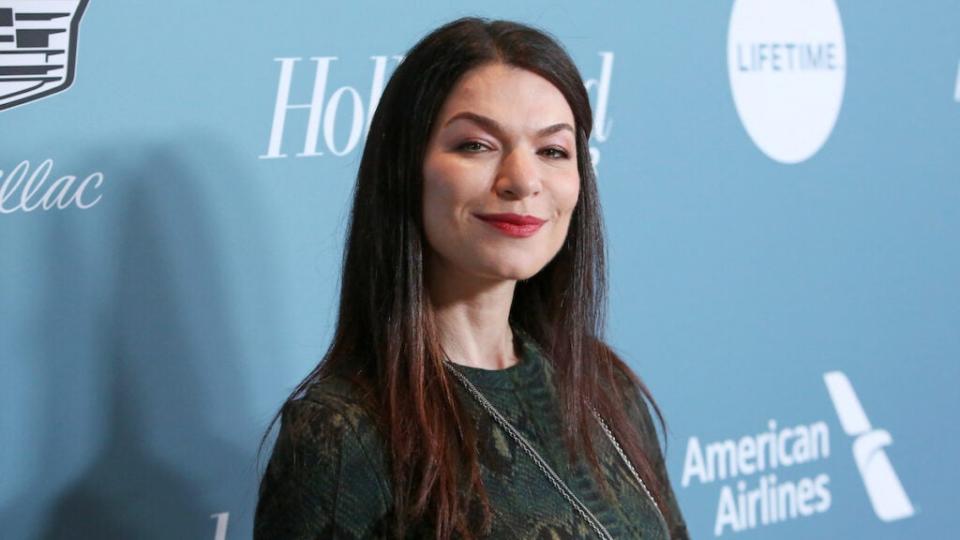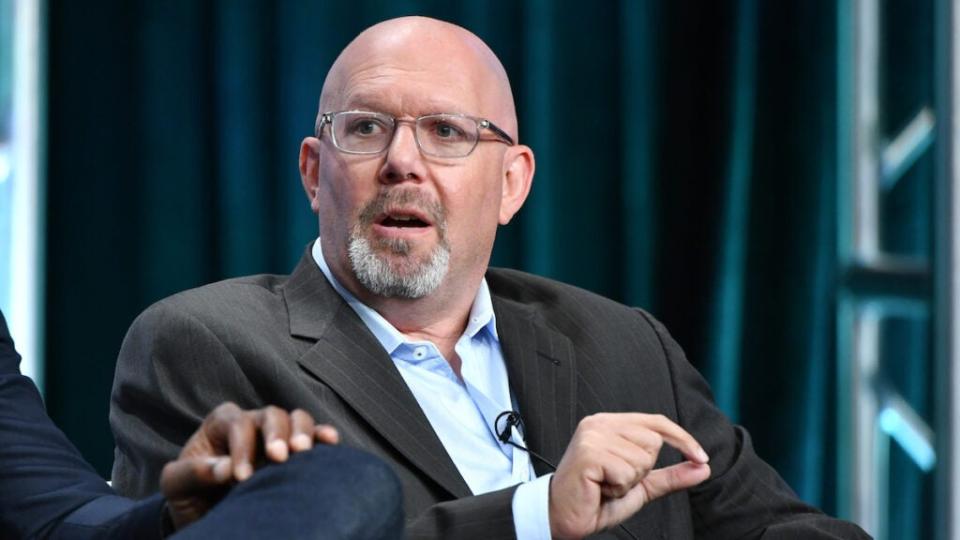Chatbots Flip the Script: For Screenwriters, AI’s Evolution Brings New Tools and New Fears
- Oops!Something went wrong.Please try again later.
- Oops!Something went wrong.Please try again later.
This is Part Five of a series about AI and its impact on Hollywood. Keep reading WrapPRO for upcoming stories on AI and its effects on animation, production and copyright. Level up your entertainment career and subscribe!
The rise of generative artificial intelligence software like ChatGPT, a chatbot that allows users to enter prompts to receive human-like text, has professional writers in many industries thinking hard about what will happen when this technology gets smart enough to write full articles, poems, essays and other forms of storytelling coherently.
Some even worry their jobs could one day become obsolete.
But most screenwriters in show business who have delved into the technology see AI more as a potential new tool in the scribe’s arsenal than a competitor — at least for now.
Also Read Part One of WrapPRO’s AI Series:
AI and the Rise of the Machines: Is Hollywood About to Be Overrun by Robots?
“I feel like there’s two parts to the conversation,” Sera Gamble, co-creator of the hit Netflix series “You,” told TheWrap. “One is what happens when new technology that seems like it could really be a game-changer enters the picture, from the perspective of a business that’s run by megacorporations who are inclined to save money when possible. And then the other half is what is this as a tool to enhance the job of a writer trying to tell a story.”
She continued, “I mean, is it possible that we would one day see a film that was entirely written that way? Sure, it’s possible. But the technology is not there yet.”

Marc Guggenheim, screenwriter and creator of The CW’s Arrowverse pointed out that the Writers Guild of America has made AI an issue in current negotiations with the studios and the evolving tech has generated “quite a lot of chatter among film and television writers.”
He hasn’t heard as much from producers or studios, he added, “with one notable exception. I’m working with a producer who manages a blue-chip piece of IP and he was telling me that the studio exec for the franchise had told him, ‘I put [the franchise] into ChatGPT, and it spit out a serviceable pitch for a sequel.’”
“The cocktail party phase”
AI technology is evolving quickly. In mid-March, OpenAI released a new version of its buzzworthy ChatGPT technology based on smarter underlying technology called GPT-4. Available only via a subscription ($20 a month, after a long waitlist), the newer chatbot can build a website based on a drawing and provide responses up to 25,000 words to specific prompts. That’s roughly the size of a screenplay.
But the tech hasn’t reached the point where it can create original and compelling content without a human to guide and revise it in the first place.
“I’ve played around with ChatGPT and Google’s Bard for writing and I’ve experimented with Midjourney and Microsoft’s Image Creator for art,” Guggenheim said. “Right now, I’d say that the technology is still in the cocktail party phase.”
Also Read:
I Asked ChatGPT to Write a Movie, a TV Episode and a Country Song – Here’s What It Can and Can’t Do
A key limit on AI tech like ChatGPT is the training sets it uses, which are massive collections of data — everything from photo libraries to Wikipedia entries. New worlds, new ideas, new visions — the stuff of Hollywood, in other words — are by definition outside its scope.
“[AI] can’t do common-sense reasoning. It only can repeat or produce things by putting together stuff that it has seen,” said Rama Chellappa, a professor at Johns Hopkins University and author of “Can We Trust AI?” “Humans are capable of [developing] much better what-if scenarios, and in terms of imagining things and so on. So I think it might be [helpful with] a first draft kind of a thing, but I don’t think it’s going to match what humans can do.”
Chellappa, along with Gamble and other writers and experts who spoke with TheWrap about the potential impacts of AI on Hollywood generally agreed that the technology could streamline the writing process. Some examples included preparing loglines, mapping out pitches and devising script outlines or even first drafts.
That’s how Keith Peiris, co-founder and CEO of the San Francisco-based AI startup Tome, sees his product benefiting screenwriters in its current form. Founded in 2020, Tome makes software powered by GPT-4 and DALL-E, OpenAI’s image generator. It can create elaborate presentations and full stories based on prompts or documents provided by the user.

The program’s use of generative AI to create presentations in a flash has brought plenty of attention for the company. Its user base tripled from 1 million in February to 3 million in March. The latest version of Tome also enhanced its storymaking features, including the ability to write the story beats for a film in seconds. There’s even an option to change the tone of an entire section.
Tome’s mission, Peiris said, is to “help anyone tell a compelling story.”
“I think we can definitely help with giving [writers] a starting point,” he added. “I’ve never been a screenwriter, I’ve never written a play, so I’ll caveat it, but so often you just want to riff on something, or you don’t like the way a sentence sounds. Or you don’t like the way that a couple of paragraphs came out and you want to play with the structure. This tool can sort of refine things with you, you can tell it to make [the wording] more concise or make it sound funnier, and then you can keep just like riffing on it until you see something you like… I think it’s going to feel like this completely different way of writing versus just manually mashing the letters on your keyboard.”
Also Read:
This Story Was Not Written by a Robot: AI and the Future of News Media
The fight for fair pay
TV and film screenwriters are currently fighting for fair wages amid a changing entertainment landscape. As mentioned earlier, the WGA is in the midst of negotiations for a new contract with the Alliance of Motion Picture and Television Producers, where residuals, the discrepancies between pay for broadcast and streaming jobs and AI are among the topics on the table.
In her conversation with TheWrap, Gamble said that while the writing part of her job hasn’t changed much between 2010 and today, other than the fact more people are tuning in to her work, she actually gets paid less in the big picture since she writes scripts primarily for streamers instead of linear — where there can be more money to be made with longer seasons and creative dealmaking versus streamers which tend to pay primarily upfront.
When thinking about the possibility of Hollywood implementing AI practices in productions, her concern lies in how that could make an argument for even lower wages.
Also Read:
How Hollywood’s Guilds Are Preparing for the Dangers – and Benefits – of AI
“If this kind of technology is incorporated on a more regular basis, if it takes away some aspect of the process, does that functionally mean that writers are doing less work?” Gamble wondered. “That’s the point that I’m sort of dubious about. But I do believe that if the situation opens up where it’s possible to redefine what writers do to pay them less, definitely that will happen… If I were running a megacorporation and I saw the opportunity to make more profit, I think that’s technically my job, to grab that opportunity.”
Zack Stentz, a screenwriter and producer known for titles like “X-Men: First Class,” raised concerns about how AI could lead to fewer job opportunities in the profession five or 10 years down the line, if not sooner.
Also Read:
From ‘2001: A Space Odyssey’ to ‘M3GAN,’ AI-Themed Movies Are on the Rise | Charts
“I’ve had a lot of conversations with peers — with showrunners, screenwriters, directors in particular — and it’s a mixture of excitement because of the opportunities that [AI] presents,” he told TheWrap. “But also a lot of fear… You don’t need ChatGPT to be as good as [“Schindler’s List” writer] Steve Zaillian, but [if there’s] a ChatGPT that’s good enough to do that rough first draft or that rough outline, that then the showrunner comes in and takes over, it’s like, OK, why do you need staff writers then?”
“I’m trying to embrace the philosophy that the WGA has adopted, to wit: AI is a potentially powerful tool for writing, the same way Photoshop is a tool for image manipulation,” Guggenheim said. “And by that score, it does its job fairly well. For example, one of the more tedious aspects of writing for me is generating character names. AI is really great at this aspect of the job.”
With those concerns in mind, the WGA released a statement in March outlining its proposed rules for AI-generated writing for film and TV, which were designed to ensure that studios “can’t use AI to undermine writers’ working standards including compensation, residuals, separated rights and credits.”
The WGA’s proposal to regulate use of material produced using artificial intelligence or similar technologies ensures the Companies can’t use AI to undermine writers’ working standards including compensation, residuals, separated rights and credits. #WGAStrong
1/7
— Writers Guild of America West (@WGAWest) March 22, 2023
In the proposal, the WGA said it would allow studios to make suggestions to writers based on AI-created texts when writing or rewriting a script, but that AI-generated writing cannot be used as the core source material for an adaptation and that “AI-generated text cannot be considered in determining writing credits.”
Credit where credit’s due
It remains to be seen if the AMPTP, the studios’ negotiating arm, will agree to the WGA’s AI stipulations, but the question of credit is definitely on everyone’s minds.
A recent episode of Comedy Central’s “South Park” that satirized the rise of the technology was written with the help of ChatGPT. At the end of the episode, writing credit for the episode was given to both co-creator Trey Parker and to the service. Under the WGA proposal, that wouldn’t be allowed.
Because ChatGPT pulls from stories that are already out online, as well as themes and ideas that match the prompts provided, and brings back a response that’s a collage of sorts of already extant writing, whether its output can be considered original is a matter of some debate.
Peiris said Tome is working on ways for the program to become more personalized to a user’s voice and work. He envisions a version of the AI technology in which a user can tell to base its creation only on the user’s previous work, potentially by linking the program to a user’s Google Drive, thereby avoiding troublesome questions of provenance and credit.
And on the other side, he hopes that AI companies figure out ways to allow creatives to have the option to keep their work online from being scraped by their programs for inspiration without their consent.
Those features, however, will take some time to become a reality.
“I think it’s going to be really important for us to figure out how to credit folks as we advance this technology, because I mean, it’s a clear problem,” he said.
Also Read:
Faced With the AI Revolution, the Entertainment Industry Can’t Pull a Napster | PRO Insight
For Gamble, however, the problem isn’t in the AI’s inability to produce a completely original idea, but in bringing that inimitable human touch and interpretation to the work.
“There’s never been a rule that you need to come up with a story no one has ever told before. In fact, there are no stories really that have never been told before, there’s only so many plots that can be brought to life in a screenplay,” she said. “It’s entirely about execution and vision and the specific voice of the writer… Writers use all kinds of tools. We use whatever gets us through the writing process without falling into the pit of despair, so I expect that [AI] will be a part of that for some writers.”
Guggenheim thinks screenwriters aren’t going anywhere anytime soon. “That being said, anyone who bets against AI and its potential does so at their own peril,” he said.

Guggenheim thinks AI is more likely to take the role of the script doctor, handling most of the laborious rewriting of a script through prompts.
Or AI could flip the script on studio executives. Couldn’t AI produce the notes they send just as well?
“Personally, I’m horrified by the idea of getting notes from a computer, but it’s absolutely something we’re going to be seeing sooner rather than later,” he said.
Loree Seitz, Scott Mendelson and Jeremy Fuster contributed to this story.
This is Part Five of a series about AI and its impact on Hollywood. Keep reading WrapPRO for upcoming stories on AI and animation, production and copyright.
Read Part One: AI and the Rise of the Machines: Is Hollywood About to Be Overrun by Robots?
Read Part Two: How Hollywood’s Guilds Are Preparing for the Dangers – and Benefits – of AI
Read Part Three: This Story Was Not Written by a Robot: AI and the Future of News Media
Read Part Four: The Chatbot Stays in the Picture: How AI Could Transform Acting
Also Read:
AI and the Rise of the Machines: Is Hollywood About to Be Overrun by Robots?

